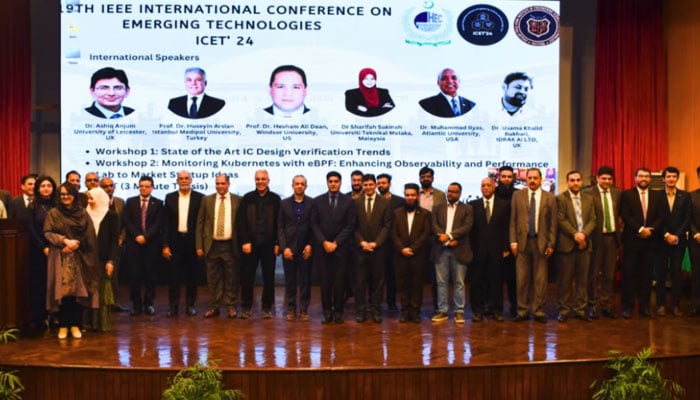International moot: Need stressed for more research on emerging technologies
PESHAWAR: Speakers at the Institute of Electrical and Electronics Engineers (IEEE) International Conference on Emerging Technologies (ICET) 2024 at Ghulam Ishaq Khan Institute of Engineering Sciences and Technology said there was an urgent need to conduct more result-oriented research on emerging technologies to meet the new global challenges while making the people life more comfortable in future.
The two-day conference which concluded on Wednesday, was organised by the Faculty of Computer Science and Engineering (FCSE), GIK Institute, with a collaboration of IEEE Islamabad and Peshawar chapter. Scholars from various foreign and national universities graced the conference, said a press release. The foreign from abroad were Prof Dr Ashiq Anjum, University of Leicester, UK, Prof Dr Huseyin Arslan, Istanbul Medipol University Turkiye, Prof Dr Heshman Ali, Windsor University, USA, Dr Sharifah Sakinah, University of Teknikal Melaka, Malaysia, Dr Muhammad Ilyas, Florida Atlantic University, USA and Dr Usama Khalid Bukhari IdrakAi LTD, UK.
Shakil Durrani, Executive Director of the GIK Institute parent body, Society for the Promotion of Engineering Sciences and Technology in Pakistan (SOPREST), the chief guest, said that the conference had established links among the scholars that would work to boost connectivity and knowledge.
Prof Anjum said that at present AI was neither safe nor reliable and there was a need for a more robust approach to make it more result-oriented.
The AI and emerging technologies are going to transform the health system and we would be able to say that a particular disease is coming to a person while studying genetic issues, he said, adding that efforts had been underway to make AI more reliable and productive.
Prof Arslan said that the fast changes seen by the world in fields of emerging technologies were just the beginning, and shortly more breakthroughs in this field were expected to be achieved. The technology of 5G is not sufficient to address the new challenges and the world has to move to 6G and at the same time there is a need for flexibility to meet the rapidly increasing requirements of the people. “The role of AI in wireless communication is critical,” he said.
Jafar Safdar, the chief executive officer of an Islamabad-based company, said the gathering of scholars, academicians and researchers from national and international universities was a big success, providing a platform for them to exchange knowledge with each other on how they could work jointly to achieve the desired results in the field of emerging technologies.
Prof Dr Fazal Ahmad Khalid, the rector of GIK Institute, said the conference provided an opportunity to see how the countries moved at an international level. He said: “The world is rapidly changing. We have already seen extraordinary developments but at the same time the globe faces new emerging challenges and there is a dire need to take practical steps to address them”.
Dr Muhammad Uzair Khan, chair, the IEEE Islamabad chapter, said the conference had enabled the participants to resolve numerous problems at the local and international level and they continued their work for creating an environment of collaboration and cooperation among scholars and universities at national and world level. Prof Dr S M Hasan Zaidi, Pro-rector Academics also spoke on the occasion.
-
 Jake Paul Criticizes Bad Bunny's Super Bowl LX Halftime Show: 'Fake American'
Jake Paul Criticizes Bad Bunny's Super Bowl LX Halftime Show: 'Fake American' -
 Prince William Wants Uncle Andrew In Front Of Police: What To Expect Of Future King
Prince William Wants Uncle Andrew In Front Of Police: What To Expect Of Future King -
 Antioxidants Found To Be Protective Agents Against Cognitive Decline
Antioxidants Found To Be Protective Agents Against Cognitive Decline -
 Hong Kong Court Sentences Media Tycoon Jimmy Lai To 20-years: Full List Of Charges Explained
Hong Kong Court Sentences Media Tycoon Jimmy Lai To 20-years: Full List Of Charges Explained -
 Coffee Reduces Cancer Risk, Research Suggests
Coffee Reduces Cancer Risk, Research Suggests -
 Katie Price Defends Marriage To Lee Andrews After Receiving Multiple Warnings
Katie Price Defends Marriage To Lee Andrews After Receiving Multiple Warnings -
 Seahawks Super Bowl Victory Parade 2026: Schedule, Route & Seattle Celebration Plans
Seahawks Super Bowl Victory Parade 2026: Schedule, Route & Seattle Celebration Plans -
 Keto Diet Emerges As Key To Alzheimer's Cure
Keto Diet Emerges As Key To Alzheimer's Cure -
 Chris Brown Reacts To Bad Bunny's Super Bowl LX Halftime Performance
Chris Brown Reacts To Bad Bunny's Super Bowl LX Halftime Performance -
 Trump Passes Verdict On Bad Bunny’s Super Bowl Halftime Show
Trump Passes Verdict On Bad Bunny’s Super Bowl Halftime Show -
 Super Bowl 2026 Live: Seahawks Defeat Patriots 29-13 To Win Super Bowl LX
Super Bowl 2026 Live: Seahawks Defeat Patriots 29-13 To Win Super Bowl LX -
 Kim Kardashian And Lewis Hamilton Make First Public Appearance As A Couple At Super Bowl 2026
Kim Kardashian And Lewis Hamilton Make First Public Appearance As A Couple At Super Bowl 2026 -
 Romeo And Cruz Beckham Subtly Roast Brooklyn With New Family Tattoos
Romeo And Cruz Beckham Subtly Roast Brooklyn With New Family Tattoos -
 Meghan Markle Called Out For Unturthful Comment About Queen Curtsy
Meghan Markle Called Out For Unturthful Comment About Queen Curtsy -
 Bad Bunny Headlines Super Bowl With Hits, Dancers And Celebrity Guests
Bad Bunny Headlines Super Bowl With Hits, Dancers And Celebrity Guests -
 Insiders Weigh In On Kim Kardashian And Lewis Hamilton's Relationship
Insiders Weigh In On Kim Kardashian And Lewis Hamilton's Relationship




